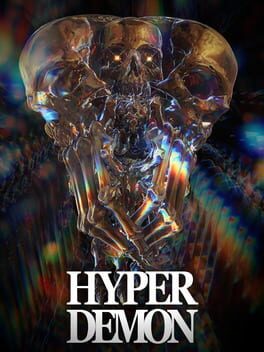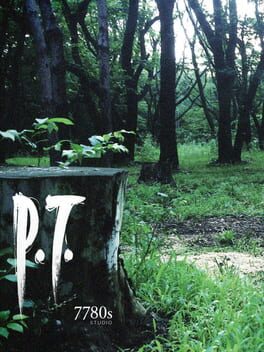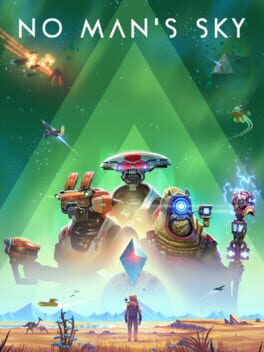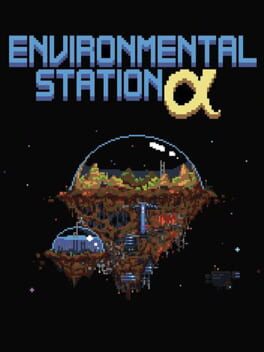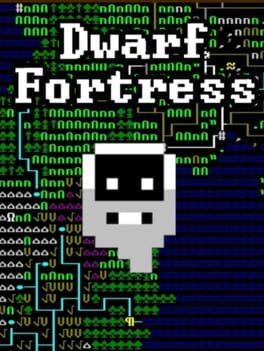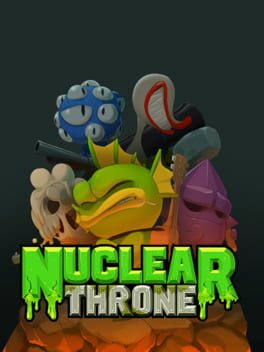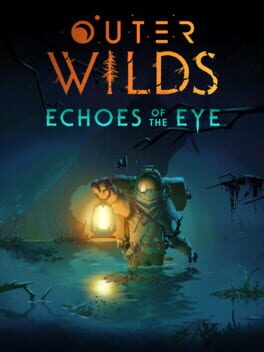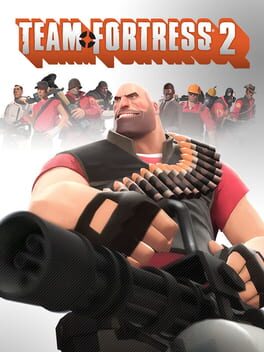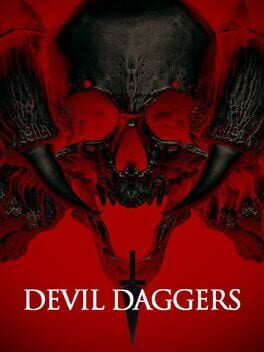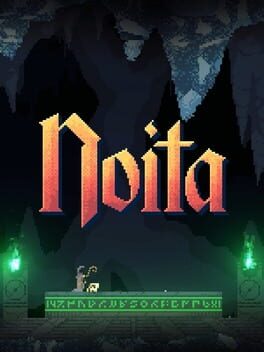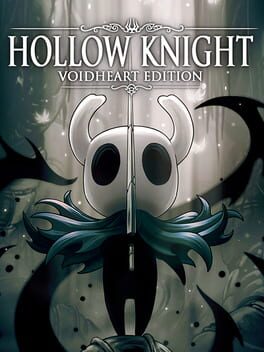iznaroth
2022
Devil Daggers' cooler cousin, but the blistering pace combined with piling on new tech means a lot more salt. The hyper-aggresive scoring essentially repairs the frustrations of DD - Hyper Demon is entirely the climax of a DD run with none of the setup. In exchange, however, it's added a lot of new tricks & tactics to help you keep up with the new paradigm of aggression. This makes the skill ceiling seem higher, but also leads to drastically more frustrating or unreadable deaths. I'll elaborate for a bit:
- The dash / stomp keybinding takes a while to adjust, and you will be constantly misdashing into enemies.
- Scuttlebugs are a source of frustration, eating a lot of damage if you fail to stomp them out or rail laser them (and those misdashes will inevitably cause such an occurrence).
- Snakes are extremely difficult to read and have to be widely avoided when attempting to grab the powerup, which is made difficult by their flailing hitboxes.
- The dodge is interesting, but seems to fuzz up hitboxes or squeeze you out of unlivable situations, which leads to some uncertainty with what is lethal and what isn't.
- The triple-laser auto aim is just fuzzy enough to feel inconsistent, with no clear indication of range beyond a sound that I find occasionally hard to parse (it'll ding '3' times and only target one or two enemies).
- The rail laser itself is extremely precise and requires much harsher aim than anything else in the game.
- The mega-laser you get from holding rclick when you nab the powerup is almost totally useless without a green bomb or a big crystal.
- Spiders are meant to drop and become vulnerable when approached/dashed under, but the trigger / indication for their drop-invulnerable states is mediocre (a sound cue very late into their descent, and not much more than a leg flail when spawning a bomb).
- The arena's dim-lit wobbliness makes it hard to tell where any edge is when shit's gone wrong until you're already walking into it, and enemies completely disappear when outside the border.
- Loads of bullet-time slowmo + crazy ultra-bendy FOV nonsense makes gauging distances hard.
Since a lot of these are less "hardline issues" and more "control scheme and enemy handling fuzziness", I expect to care less about them the more I play. At ~200 seconds, I still find them decently frustrating, but it was distinctly worse as I was initially learning the ropes. That's more likely a consequence of Devil Daggers' extreme simplicity and my own expectations, though. That is to say - if anyone can correct/inform me on why these features act this way, please do. Even with a tutorial mode, this game is fairly obtuse.
The tl;dr here is that HD has managed to squeeze the best-est bits of DD's prime, but has lost a lot of the level-headed consistency and simplicity during the translation. I wouldn't disagree with anyone who thinks that's a good thing, but I think it means HD is less of a Devil Daggers replacement, and more of a fantastic accompaniment when DD's frustrations boil over (and vice-versa!)
I've not spoken much on the visuals because they can't really be conveyed thru anything other than gameplay. This game opens your third eye or some shit. It's pure magic. Play at 180 FOV and develop perfect vision.
- The dash / stomp keybinding takes a while to adjust, and you will be constantly misdashing into enemies.
- Scuttlebugs are a source of frustration, eating a lot of damage if you fail to stomp them out or rail laser them (and those misdashes will inevitably cause such an occurrence).
- Snakes are extremely difficult to read and have to be widely avoided when attempting to grab the powerup, which is made difficult by their flailing hitboxes.
- The dodge is interesting, but seems to fuzz up hitboxes or squeeze you out of unlivable situations, which leads to some uncertainty with what is lethal and what isn't.
- The triple-laser auto aim is just fuzzy enough to feel inconsistent, with no clear indication of range beyond a sound that I find occasionally hard to parse (it'll ding '3' times and only target one or two enemies).
- The rail laser itself is extremely precise and requires much harsher aim than anything else in the game.
- The mega-laser you get from holding rclick when you nab the powerup is almost totally useless without a green bomb or a big crystal.
- Spiders are meant to drop and become vulnerable when approached/dashed under, but the trigger / indication for their drop-invulnerable states is mediocre (a sound cue very late into their descent, and not much more than a leg flail when spawning a bomb).
- The arena's dim-lit wobbliness makes it hard to tell where any edge is when shit's gone wrong until you're already walking into it, and enemies completely disappear when outside the border.
- Loads of bullet-time slowmo + crazy ultra-bendy FOV nonsense makes gauging distances hard.
Since a lot of these are less "hardline issues" and more "control scheme and enemy handling fuzziness", I expect to care less about them the more I play. At ~200 seconds, I still find them decently frustrating, but it was distinctly worse as I was initially learning the ropes. That's more likely a consequence of Devil Daggers' extreme simplicity and my own expectations, though. That is to say - if anyone can correct/inform me on why these features act this way, please do. Even with a tutorial mode, this game is fairly obtuse.
The tl;dr here is that HD has managed to squeeze the best-est bits of DD's prime, but has lost a lot of the level-headed consistency and simplicity during the translation. I wouldn't disagree with anyone who thinks that's a good thing, but I think it means HD is less of a Devil Daggers replacement, and more of a fantastic accompaniment when DD's frustrations boil over (and vice-versa!)
I've not spoken much on the visuals because they can't really be conveyed thru anything other than gameplay. This game opens your third eye or some shit. It's pure magic. Play at 180 FOV and develop perfect vision.
2014
What's really interesting about P.T. is the liberties we afford to something that isn't just unfinished, but absolutely unfinishable. It's essentially a palette of ideas implying the shadow of a far more elaborate and terrifying whole (which we'll never get to see anymore of) - and if that isn't an ironically meta expression of what makes classic Horror work then I don't know what is.
A part of it is in the execution – P.T.’s ideas are braindead simple, but they’re represented in a very fittingly-and-convincingly photorealistic way that continues to age quite well. It isn’t really meant to surprise or refresh more than precisely evoke a familiar feeling and aesthetic.
This means that people can freely acclaim P.T. as essentially perfect, since it's a clean execution of setup for a nonexistent whole – just the fun parts. It has no time to run out of steam or to overextend and compromise the uncertainty of its world and rules. It's an island of ideal horror tropes sharpened and angled towards nowhere, unburdened (mostly) from narrative, meaning and interpretation. Where a full game would likely introduce more certainty/specificity in interpretation so as to appear cohesive, P.T. gets to relate on a slightly more direct level to each player's understanding of its sharply-imagined classic imagery - just the scares, the atmosphere, the thesis - and that purity is worth something.
A part of it is in the execution – P.T.’s ideas are braindead simple, but they’re represented in a very fittingly-and-convincingly photorealistic way that continues to age quite well. It isn’t really meant to surprise or refresh more than precisely evoke a familiar feeling and aesthetic.
This means that people can freely acclaim P.T. as essentially perfect, since it's a clean execution of setup for a nonexistent whole – just the fun parts. It has no time to run out of steam or to overextend and compromise the uncertainty of its world and rules. It's an island of ideal horror tropes sharpened and angled towards nowhere, unburdened (mostly) from narrative, meaning and interpretation. Where a full game would likely introduce more certainty/specificity in interpretation so as to appear cohesive, P.T. gets to relate on a slightly more direct level to each player's understanding of its sharply-imagined classic imagery - just the scares, the atmosphere, the thesis - and that purity is worth something.
2016
Yeah, I am that guy (apparently not the only one by any measure) that thought NMS was "better" at launch - but only because it was more honest. I think Hello Games were beaten into submission by a general audience that wouldn't have ever played the sort of game NMS would be if it was advertised correctly, and even then, I'm not sure if it even would have worked out.
I at least want to acknowledge that it's a great thing when developers can recover from failure without collapsing under the infinitely-hostile weight of the internet. Hello Games buckled down despite nigh-constant vitriol and managed to probably save their careers in the process. It's an admirable thing, but it doesn't excuse the game on its own.
See, I only marginally enjoy resource-grinder base-builders the likes of which NMS now rests alongside. I find that they survive off of the "promise" you make to yourself right at the start, that you totally could make something badass and enormous given enough commitment- and very rarely ever do, as the systems become cumbersome and you realize that there isn't much point in building an epic gigabase in a game you hate playing. NMS offers the appeal of having Your Own Planet to build on, with endless possibilities for surrounding terrain and architectural context, but that doesn't change much - especially with how limiting the systems themselves are. Resource gathering is grindy and unrewarding in much the same way it is in other, similar games.
When NMS adopted this ethos, it was doubly baffling because the core appeal of the game (to me!) was disjointed wandering. I don't want to be bolted down, I don't want to seek resources to continue, I want to fly through a bazillion retro sci-fi book covers, shoot at some stuff and listen to breezy electronic post-rock. It should be evident that the scrutiny of settling down will kinda murder the illusion of an endless cosmos once you start to see the patterns for what they are.
That's the real issue, then - it was always a bit too optimistic to think this terrain engine could produce infinitely-many unique and involving locations. The idea that I conjured up for what NMS ought to be when I was watching the earlier trailers was a foggy, impossible game that even I didn't understand why I'd like beyond audiovisual satisfaction. I've had moments with this game that felt fun, exploratory, and evoked the right kind of starry-eyed excitement, but that always comes with a timer - how long until you've seen it all? For launch NMS, it was a short and middling experience, with some highs that were quickly stomped out by awkward mechanics. Visual updates have moved that finish line a bit further down, and mechanical updates have subsequently mired it in a lump of mostly-dull dead-ends that do little to motivate.
I at least want to acknowledge that it's a great thing when developers can recover from failure without collapsing under the infinitely-hostile weight of the internet. Hello Games buckled down despite nigh-constant vitriol and managed to probably save their careers in the process. It's an admirable thing, but it doesn't excuse the game on its own.
See, I only marginally enjoy resource-grinder base-builders the likes of which NMS now rests alongside. I find that they survive off of the "promise" you make to yourself right at the start, that you totally could make something badass and enormous given enough commitment- and very rarely ever do, as the systems become cumbersome and you realize that there isn't much point in building an epic gigabase in a game you hate playing. NMS offers the appeal of having Your Own Planet to build on, with endless possibilities for surrounding terrain and architectural context, but that doesn't change much - especially with how limiting the systems themselves are. Resource gathering is grindy and unrewarding in much the same way it is in other, similar games.
When NMS adopted this ethos, it was doubly baffling because the core appeal of the game (to me!) was disjointed wandering. I don't want to be bolted down, I don't want to seek resources to continue, I want to fly through a bazillion retro sci-fi book covers, shoot at some stuff and listen to breezy electronic post-rock. It should be evident that the scrutiny of settling down will kinda murder the illusion of an endless cosmos once you start to see the patterns for what they are.
That's the real issue, then - it was always a bit too optimistic to think this terrain engine could produce infinitely-many unique and involving locations. The idea that I conjured up for what NMS ought to be when I was watching the earlier trailers was a foggy, impossible game that even I didn't understand why I'd like beyond audiovisual satisfaction. I've had moments with this game that felt fun, exploratory, and evoked the right kind of starry-eyed excitement, but that always comes with a timer - how long until you've seen it all? For launch NMS, it was a short and middling experience, with some highs that were quickly stomped out by awkward mechanics. Visual updates have moved that finish line a bit further down, and mechanical updates have subsequently mired it in a lump of mostly-dull dead-ends that do little to motivate.
This little game has a lot more gravity than you may expect. It plays as a classic riff on Metroid with a standard-but-tight lineup of abilities and a challenging roster of bosses and areas, wrapped nicely in a disorienting-but-cute ultra low-res artstyle and topped with a brilliantly laid-back soundtrack.
That's not the whole of it, though. What escalates ESA from decent to important is tricky, because even mentioning it kinda spoils the fun - be warned.
Of course it's the postgame, a knot of secrets and weirdness that descends far deeper than I think anybody expected it to. This is a polarizingly ridiculous progression, one that requires puzzle solving and codebreaking for which I can't think of many obvious analogues. It reinvigorates that early sensation these games were always meant to evoke - there's no way of knowing what's truly out there, and it's always more than you think.
It all makes ESA feel almost essential for metroidvania enjoyers, with both rock-solid fundamentals and plenty of unique appeal. I've got high hopes for the sequel.
That's not the whole of it, though. What escalates ESA from decent to important is tricky, because even mentioning it kinda spoils the fun - be warned.
Of course it's the postgame, a knot of secrets and weirdness that descends far deeper than I think anybody expected it to. This is a polarizingly ridiculous progression, one that requires puzzle solving and codebreaking for which I can't think of many obvious analogues. It reinvigorates that early sensation these games were always meant to evoke - there's no way of knowing what's truly out there, and it's always more than you think.
It all makes ESA feel almost essential for metroidvania enjoyers, with both rock-solid fundamentals and plenty of unique appeal. I've got high hopes for the sequel.
2018
I'd say this is the best 2D platformer I've ever played. The cohesive, charming storytelling with great pixel art is the cherry on top, but Celeste's brilliance is really in the mechanics and design. Madeline's moveset is involvingly technical and very deep, but it does not demand performance so much as it invites the player to master exactly as much as they need to in order to find a sense of accomplishment and reward from it.
Nearly every screen is well-considered and encourages the player to find their own version of the desired solution, incorporating whatever techniques they see fit to navigate obstacles. As the game progresses these challenges become a bit less flexible and more demanding, but Celeste never feels like it veers into overtly cruel design. The tone of the game and the speed at which it resets always gives off a feeling of friendly determination - "It's OK, you've got this," even if you have to fail a thousand times to get there. This lets the bonus content approach near-Kaizo segments of length and requirement without ever feeling mean-spirited like those games often do.
The creativity with which Celeste explores every possible facet of its control scheme, the constant novelty of new mechanics and the wonderfully satisfying audio-visual-narrative packaging that surrounds it makes for an obvious winner. What's a better analogue of the platformer genre than the process of climbing a mountain? Slow, methodical persistence and a good bit of self-trust leads to mastery. One of the greats.
Nearly every screen is well-considered and encourages the player to find their own version of the desired solution, incorporating whatever techniques they see fit to navigate obstacles. As the game progresses these challenges become a bit less flexible and more demanding, but Celeste never feels like it veers into overtly cruel design. The tone of the game and the speed at which it resets always gives off a feeling of friendly determination - "It's OK, you've got this," even if you have to fail a thousand times to get there. This lets the bonus content approach near-Kaizo segments of length and requirement without ever feeling mean-spirited like those games often do.
The creativity with which Celeste explores every possible facet of its control scheme, the constant novelty of new mechanics and the wonderfully satisfying audio-visual-narrative packaging that surrounds it makes for an obvious winner. What's a better analogue of the platformer genre than the process of climbing a mountain? Slow, methodical persistence and a good bit of self-trust leads to mastery. One of the greats.
2006
DF is one of tremendously few games that can consistently invent novel situations. One can see the threading if they squint, but when the game is explaining that your recently-vampirized dwarf has been executed because he was too excited about it to keep the secret to himself, or that your poor woodcutter was crushed by a tree because he was spooked by something nearby and ran under it as it fell, the limitations stop mattering so much.
2015
My God, they did it again!
This content justifies itself just by how cleanly it fits in with a game so tightly-composed that it seemed impossible to modify. The process of accessing it alone is probably worth the price of admission, but it's a good thing the rest of the DLC is so damn good, too.
Once again, there are aspects of EotE that may alienate some people in order to appeal to others. In this case, the horror aspects of the base game (which were mostly confined to one area and a lingering sense of cosmic dread) have been exaggerated and focused on. The new mechanics are a bit awkward but they work in a way that feels natural to the Outer Wilds ethos, so I think they're a good addition.
The greatest achievement that EotE pulled, for me at least, was how much it expanded on the story of the base game. It both satisfies perhaps the only significant "plothole" of the base game and greatly reinforces the impact and meaning of the game's ending. Very strongly recommended.
This content justifies itself just by how cleanly it fits in with a game so tightly-composed that it seemed impossible to modify. The process of accessing it alone is probably worth the price of admission, but it's a good thing the rest of the DLC is so damn good, too.
Once again, there are aspects of EotE that may alienate some people in order to appeal to others. In this case, the horror aspects of the base game (which were mostly confined to one area and a lingering sense of cosmic dread) have been exaggerated and focused on. The new mechanics are a bit awkward but they work in a way that feels natural to the Outer Wilds ethos, so I think they're a good addition.
The greatest achievement that EotE pulled, for me at least, was how much it expanded on the story of the base game. It both satisfies perhaps the only significant "plothole" of the base game and greatly reinforces the impact and meaning of the game's ending. Very strongly recommended.
2019
An actual landmark game. Virtually perfect thematic/aesthetic cohesion across the board AND actually using the medium of interactivity to create something otherwise impossible? That's big.
This is a rare game that I think has both very general appeal and the power and presence to be called a masterpiece. It'll screw a few people over by virtue of being a semi-obtuse puzzler with a ton of trust in the player's intuition (meaning rough onboarding especially for people unfamiliar with spaceflight, or just games in general) but you've gotta lose some people along the way, so it's a worthy if unfortunate sacrifice.
Spoilers obviously murder this game, and I'm not planning on a fifty-mile-long analysis so it isn't worth getting into. You kinda just gotta trust that there's a reason so many people rave about it. Fly a spaceship and solve some weird mysteries in a solar system where nothing is as it seems - who isn't down for that?
This is a rare game that I think has both very general appeal and the power and presence to be called a masterpiece. It'll screw a few people over by virtue of being a semi-obtuse puzzler with a ton of trust in the player's intuition (meaning rough onboarding especially for people unfamiliar with spaceflight, or just games in general) but you've gotta lose some people along the way, so it's a worthy if unfortunate sacrifice.
Spoilers obviously murder this game, and I'm not planning on a fifty-mile-long analysis so it isn't worth getting into. You kinda just gotta trust that there's a reason so many people rave about it. Fly a spaceship and solve some weird mysteries in a solar system where nothing is as it seems - who isn't down for that?
2007
Witty, inventive, weird, configurable and very deep. The desolate state it's been in for a while now is a damn shame. Like most Source games, the community servers are (or were, now) an infinite abyss of weird subcommunities and incoherent map architecture. Virtually impossible to encapsulate the full extent of my experience with it in any amount of words - it's just too broad. The core of it is, was and always will be the best balance between tight competitive shooting and ludicrous wacky mayhem.
2011
Here's why it's important to consider a unified world rather than separate levels! DaS is very flawed, but it has yet to be conquered when it comes to the sensation of navigating an actual world. It is intensely silly and ridiculous from a "realistic" perspective, but the way Lordran fits together is so natural and intuitive in its dreamlike fantasy-delusions that there's no need to affect any sense of reality at all. It's just hard to describe the feeling of finding a new route to a familiar place, or reflecting on the ridiculous distances you've travelled uninterrupted.
In the same rather manipulative sense that it's easier to convince someone of something by making them think they came up with the idea, games are far more fun when you're tricked into thinking you navigated your way from point A to point B instead of being told to. Dark Souls remains the primary embodiment of that philosophy, using careful and subtle level design to encourage the player towards destinations without ever actually forcing them anywhere. It makes the game, the journey feel more personal. Pair that with combat systems that follow roughly the same philosophy and the game was inevitably going to be good.
In the same rather manipulative sense that it's easier to convince someone of something by making them think they came up with the idea, games are far more fun when you're tricked into thinking you navigated your way from point A to point B instead of being told to. Dark Souls remains the primary embodiment of that philosophy, using careful and subtle level design to encourage the player towards destinations without ever actually forcing them anywhere. It makes the game, the journey feel more personal. Pair that with combat systems that follow roughly the same philosophy and the game was inevitably going to be good.
2016
If the two things I like the most in shooters are "trying to ride a wave of intensifying chaos before it drowns me" and "straightforward and predictable systems that easily indicate what I can improve", this is logically the perfect shooter. The presentation is also badass and genuinely horrifying. The last moments of a new high-score when it feels like the world is tearing itself apart around you are pretty magical.
I pick it up once every few months and creep a bit closer to the elusive Devil Dagger. 450 now? Only a few more sprints and surely I'll get it...
I pick it up once every few months and creep a bit closer to the elusive Devil Dagger. 450 now? Only a few more sprints and surely I'll get it...
2020
The deranged mechanical apex of the roguelite. The wham-line of "every pixel is simulated" kind of implies a gimmick game, but Noita's fusion of spellcraft and chemistry makes for a very compelling experience. The "spell programming" system is insanely opaque, but also incredibly powerful. The interactions between materials, attacks, and enemies are unpredictable and have to be carefully observed to be understood. The map is absolutely gargantuan and the game adamantly refuses to explain anything, relying 100% on the intuition of the player.
It's probably the most willfully obtuse game I've ever played. It has the highest "entry cost" for learning that I've seen in any roguelite. This is a tricky design space and many will hate it, but the reward for careful observation and reckless experimentation is one of the deepest, most surprising and just pure fun roguelites of all time.
It's probably the most willfully obtuse game I've ever played. It has the highest "entry cost" for learning that I've seen in any roguelite. This is a tricky design space and many will hate it, but the reward for careful observation and reckless experimentation is one of the deepest, most surprising and just pure fun roguelites of all time.
Rating for the free "dlc" that was slowly added to the game in the years following its release. Though the map was never expanded significantly (which is usually the most exciting premise for a metroidvania), the free updates were very substantial. The Grimm Troupe was a satisfying motive to retread through the map that culminated in a comparably difficult superboss a.la Radiance, and Godmaster gave the game its most enduring challenge modes and a feature 99% of games ought to include - the ability to freely challenge any boss. Godmaster is particularly brilliant with the addition of Godhome, showing again how much of HK is carried by the strong art direction and use of semi-3D scenes to conjure a sense of scale and place.
2016
